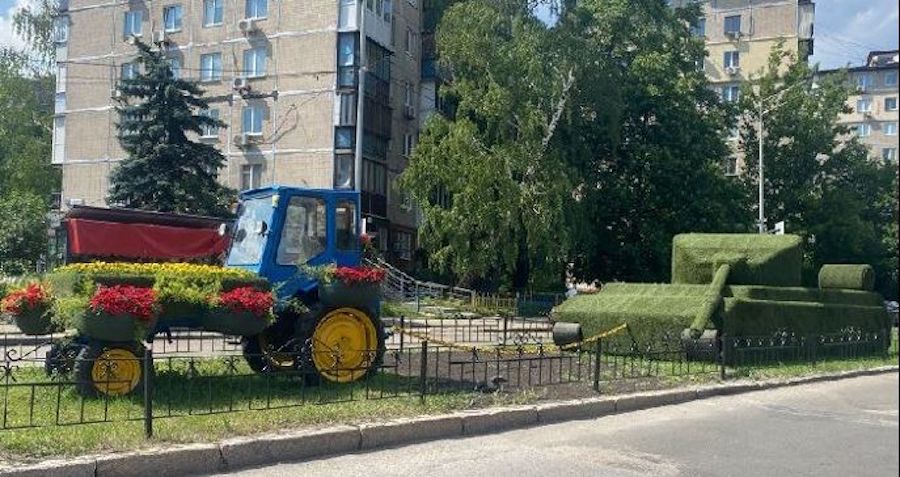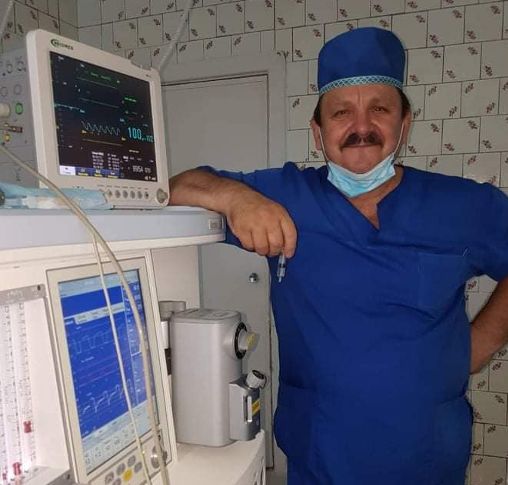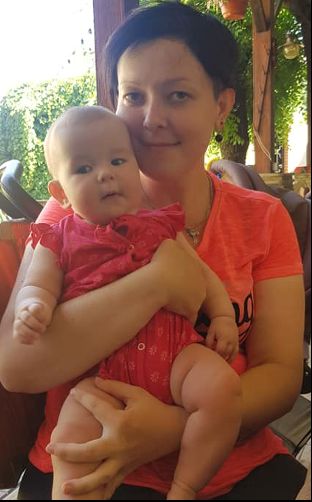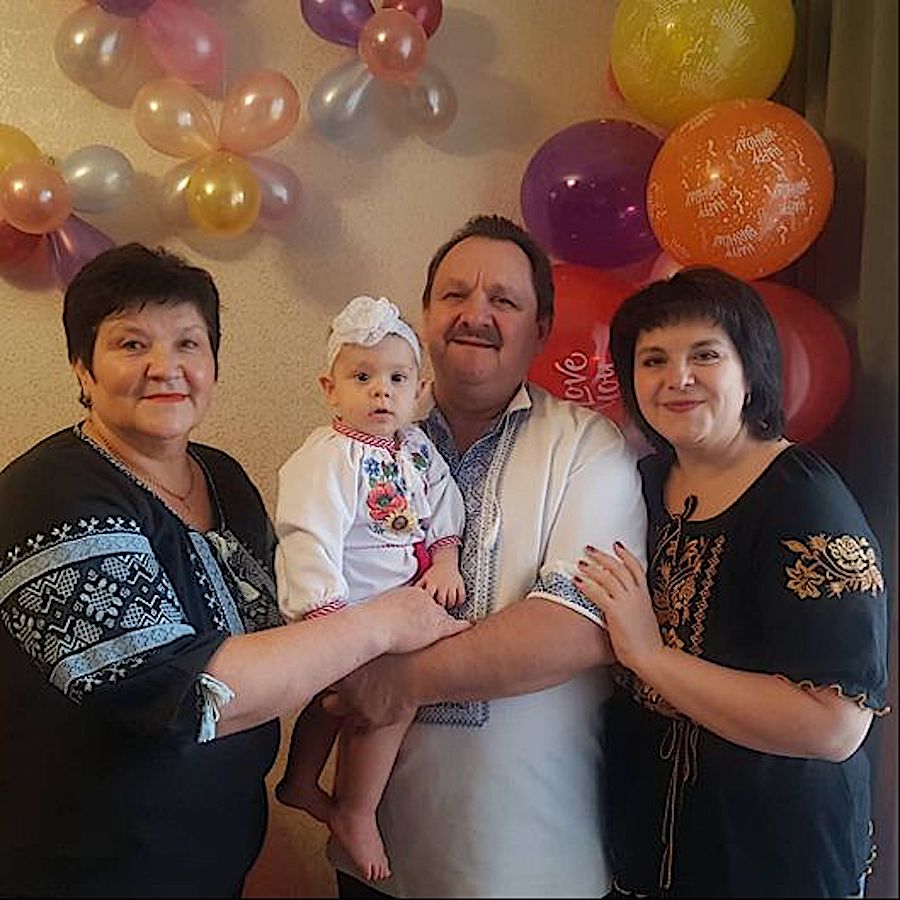Escape from Severodonetsk: a Ukrainian family's experience of the horrors of war
On March 1, 2022, a shell hit a car carrying the Popovichenko family fleeing from the war-torn Severodonetsk. Shrapnel hit Anna Popovichenko in the leg. The second wounded her friend, 34-year-old Marina in the thigh, who was also leaving the city with her daughter. Anna’s father, who was driving, was mortally wounded in the head.
The car burst into flames. The women and children tried to crawl away from the car, which would explode at any moment. Anna lay in a snowy field and thought about her red down jacket, which might be a target. In fact, it saved her.
From hromadske.ua on the fate of Ukrainians in Severeodonetsk.
Grass tank
Kyiv, June 2022, not far from the Polytechnic Institute metro station, city planners have arranged a flower bed in the shape of a tractor pulling a tank. It smells like fresh cut grass and people are taking pictures nearby.
39-year-old Anna Popovichenko walks past the installation with her daughter, two-year-old Marichka. The girl comments on everything she sees, flooding her mother with questions, and when her eyes stop on the “grass tank”, Marichka freezes. “Will it shoot at us??” she shouts and clings to her mother.
Anna tries to explain that this is a flower bed, there is nothing to be afraid of. The child’s eyes are full of tears.

“We left without you. I am sorry”
In 2014 Anna Popovichenko left her native Lugansk owing to the conflict. She still misses the city where her parents and grandparents lived and worked. First she moved to Kharkov, as the Luhansk National Agrarian University had moved there, where a woman taught economics. In 2019 she gave birth to Marichka and returned to the Luhansk region, to Severodonetsk, where her parents lived. Her daughter went to kindergarten and Anna planned to resume her teaching career. But in 2021, the invasion happened.
“On February 24 it was still quiet at night in Severodonetsk. And in the afternoon, glass was already blown out in the entrance,” the woman says.
Some neighbors and friends left immediately. Anna’s father, Sergey Popovichenko, headed the anesthesia department of the oncology dispensary, and did not want to leave the city: he thought about what would happen to the patients if the doctors left.
Meanwhile, Severodonetsk was turning into a front-line city: shelling became more frequent, the number of explosions increased, heating, electricity, and gas disappeared. Those who wanted to leave but did not have their own transport had to look for people with cars and hope for a free place. Among them was Anna’s friend, Marina Voropay, the mother of two-year-old Alexandra.
Marina lived in an area that received heavy shelling. Traveling friends promised to pick her up with her daughter. Marina packed her things, went down with her child to the yard and stood there all day. The car didn’t arrive. Later she received a text message from a friend: “Your area is too dangerous. We left with you. I am sorry.”
Anna could not bring her friend and daughter to her apartment – the family was crowded in a small corridor during the shelling. But she found a place for Marina in a bomb shelter in a relatively safe area of the city.
The word “Children” was written on the windows
On March 10 Anna’s family decided to leave. Marina was sent a message: “Tomorrow we will go. Are you coming with us?” The answer came almost instantly: “Yes. Just don’t leave me.”
The next morning, Sergey Popovichenko’s Skoda set off: he was driving, next to him was his wife Natalia, behind were Anna and Marina with their daughters.

“We didn’t know how long it would take. We collected documents, equipment, some money, mother’s jewelry, medicines, daughter’s things. My father filled the gas tank. We put white sheets up on the windows with the word ‘children’. And we went,” Anna recalls.
When choosing a route they tried to find out if there were “green corridors” for evacuation. The regional authorities urged the people to leave by any available means. Sergei’s colleague, who got out of Severodonetsk a few hours earlier, called by phone and advised them to go through Rubizhne, to Kremennaya and further on to Liman.
At the exit from Rubizhne, they saw a checkpoint with a Ukrainian flag. Popovichenko’s car was approaching it, and suddenly a shot rang out from the forest — a shell had hit the checkpoint. Later, looking at the map, Anna realized that the shells were flying from the village of Varvarovka, which the Russians had captured the day before. Anna’s father turned the car in the direction of Severodonetsk, which suddenly seemed the safest place. But at that moment the car became a target for the enemy.

“My father died before my eyes”
“Something flew into our car and exploded,” Anna recalls. “I was wounded in the leg. Marina in the thigh. A fragment hit my father in the head; he died before my eyes.
Anna came to, her down jacket on fire. Among her chaotic thoughts, she recalled that a car on fire burns out in four minutes. The next thought was that the car had a full tank of gas. Anna screamed for everyone to run away. With Marina and the children, they fell out into the snow and crawled away.
Anna’s mother did not understand that her husband was dead: “Seryozha, why are you sitting there? Jump out!” Sergei’s body began to burn. Anna tried to persuade her mother to get out of the car. But she screamed that she would not let her husband burn alive, unfastened her seat belt and pulled her husband’s body out, getting burns to her face and hands. And when she realized it was futile, she crawled to the girls.
Covering the children with their own bodies, the women crawled away to a safe distance. The car exploded.
Marina left lying in the snow exhausted
From the side of Varvarovka, enemy equipment was attacking. The battle had begun.
“It was coming from all sides. Shells exploded, bullets whistled overhead,” Anna says.
She recalls how in the middle of a snow-covered field something drove in their direction — a huge tank on caterpillar tracks, with a turret and the letter Z.
Three women, hiding children under them, lay in the snow and looked with horror at the iron horror rushing at them. They heard an unusual sound – like a rustle. These were Ukrainian Javelins that smashed enemy equipment. Something flared up and slowed down. Black smoke covered the sky.
The battle lasted about two hours. All this time the women lay covering their daughters. Anna recalls that Marichka and Sandra did not cry: “Are you breathing?” she asked the child. “Yes,” the girl replied. “You’re scared?” – “Very scared”. “Are you cold?” – “Yes”.
Then the women heard someone shout: “Is there anyone alive?” They called back. “Hold on, push yourself into the ground as much as possible!” shouted the voice of the Ukrainian soldier. The battle continued, the so women could not be pulled out from under the fire.
A civilian car was driving down the road, someone desperately trying to get through the fight. He saw a burned-out car and the bodies of people in the snow. Has stopped. Deciding that there were no survivors, he was ready to move on, and then he noticed that a woman in a red down jacket was moving.
Anna vaguely remembers jumping up. Holding Marichka close to her, she ran to the car, feeling no pain. She and her mother jumped into the back seat. But they saw that the powerless Marina remained lying in the snow. Anna’s mother rushed to them, picked up and carried her little daughter to the car. Then, together with the driver, they returned for Marina, but shelling began.
A shell got stuck in the ground right next to the car, but somehow did not explode. The driver dragged Anna’s mother into the car and, hit the gas pedal, pulled towards Rubizhne. Anna recalls how she stroked Sandra along the way and as if repeating a mantra: “They will take her away.”

There was no water; a nurse brought melted snow
The hospital in Rubizhne stood where the battle continued, the area around strewn with unexploded shells. The driver brought the women to a school where there was a bomb shelter in the basement.
Anna felt that her right leg was wet — her shoes were full of blood. The wounds were treated, bandaged, and she was given painkillers. The children were changed and warmed up. There were employees of the State Emergency Service whom Anna told about everything that had happened.
The women and children were brought to the hospital. The largest fragments were pulled out of Anna’s leg, and she spent the night in a wheelchair in the hallway. The wards were filled with bedridden patients and the wounded. Sometimes they were run into by doctors or nurses who were hiding in the basement. Anna asked the nurse for water. But she reported that the water supply was not working, so instead she brought melted snow.
Anna thought about Marina all the time. When the ambulances brought the wounded, she asked the hospital workers to describe them hoping to hear about a friend. She called the rescuers on the phone, reminded them that a wounded woman remained at the battlefield near Rubizhne. She wrote messages to Marina herself to assure her that help was close.
Then there was a bus to Popasna, a diesel train to Liman, a train to Lviv. The evacuation train arrived damaged — the day before it had come under fire, the doors and windows were knocked out in the cars, and the conductors had been killed.
“About 40 wagons were filled to capacity. I don’t think anyone was riding lying down,” Anna says. “At best, people could sit down for a while. Explosions were heard. So we drove out of the horror.”
On the way, Anna got in touch with Sandra’s godmother. In Kazatin, Vinnytsia region, at the train station in the presence of police and social workers, the girl was returned to her godmother, who subsequently took custody of her.
Anna, her mother and little Marichka reached Lvov. A few months later they moved to relatives in Kyiv.
The driver who saved them
Anna did not remember the make of the car or the name of the driver who pulled them out of the fire, but a former student helped her find him — Valentin from Rubizhne serves in the Terrorist Defense Forces near Kharkov. On the phone, he told Anna that he recalls that day almost every day, thinking about whether it was possible to save Marina.
Valentin found a man from Rubizhne who was driving down that road the next day. He saw shot up cars, including a Skoda, next to which lay the charred body of a man, and a little further away that of a woman. “We stopped at every car. There were no survivors.”
But Anna kept looking. I hoped that the Russian military had taken Marina away; she wrote to the “LPR” groups. She found a girl who also lost relatives there. Her father discovered a group burial in one of the cemeteries in Rubizhne, where the names of the dead were listed. There seemed to be an inscription “Marina Voropay”. But the name of Anna’s father was not found in that cemetery. Anna received a certificate of his death in Kyiv through the court. She plans to find the place where her father is buried after the de-occupation of the Luhansk region.
The deceased 62-year-old Serhiy Popovichenko, a resuscitator at the Luhansk Regional Clinical Oncology Center, was posthumously awarded the medal “For Saving Lives” by the President of Ukraine.
Anna works at a university that has partially resumed work in the capital. She supports her mother, and Marichka goes to kindergarten. Every day she remembers her grandfather and tells a sad story: “I was very scared. They shot at us. Grandpa was shot in the head. Our car caught fire. Grandpa is no longer with us.”
The material was created as part of the Life of War project with the support of the Public Interest Journalism Lab and IWM.


















